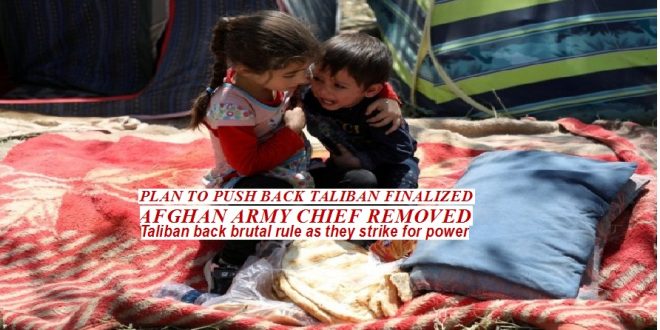12-08-2021
By SJA Jafri + Bureau Report + Agencies
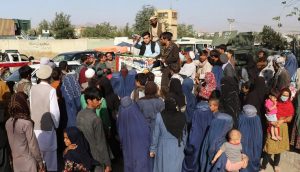 KABUL/ ISLAMABAD/ WASHINGTON: Taliban fighters could isolate Afghanistan’s capital in 30 days and possibly take control of it in 90, a US defence official said Wednesday, citing US intelligence.
KABUL/ ISLAMABAD/ WASHINGTON: Taliban fighters could isolate Afghanistan’s capital in 30 days and possibly take control of it in 90, a US defence official said Wednesday, citing US intelligence.
The official, speaking to PMI on condition of anonymity, said the new assessment of how long Kabul could stand was a result of the Taliban’s rapid gains as US-led foreign forces leave.
“But this is not a foregone conclusion,” the official added, saying that the Afghan security forces could reverse the momentum by putting up more resistance.
The Taliban now control 65% of Afghanistan and have taken or warn of taking over 11 provincial capitals, a senior EU official said on Tuesday. Faizabad, in the northeastern province of Badakhshan, on Wednesday became the eighth provincial capital to be taken over by the Taliban.
All gateways to Kabul, which lies in a valley surrounded by mountains, were choked with civilians entering the city and fleeing the ongoing fight between the Afghan forces and the Taliban soldiers, a Western security source there told Reuters.
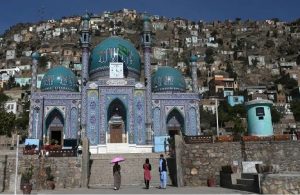 Foreign countries are trying to ensure their staff leave Kabul quickly, five foreign security officials told Reuters. One said international airlines were also being asked to evacuate staff.
Foreign countries are trying to ensure their staff leave Kabul quickly, five foreign security officials told Reuters. One said international airlines were also being asked to evacuate staff.
President Ashraf Ghani flew to Mazar-i-Sharif to rally old warlords to the defence of the biggest city in the north as Taliban forces closed in.
Jawad Mujadidi, a provincial council member from Badakhshan, said the Taliban had laid siege to Faizabad before launching an offensive on Tuesday.
“With the fall of Faizabad, the whole of the northeast has come under Taliban control,” Mujadidi told Reuters.
The Taliban want to defeat the US-backed government and re-impose their rule. The speed of their advance has shocked the government and its allies.
Homeland
US President Joe Biden urged Afghan leaders to fight for their homeland, saying on Tuesday he did not regret his decision to withdraw. He said Washington had spent more than $1 trillion over 20 years and lost thousands of US troops.
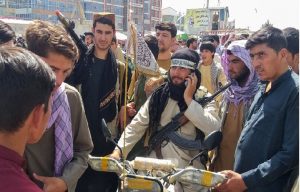 The United States was providing significant air support, food, equipment and salaries to Afghan forces, he said.
The United States was providing significant air support, food, equipment and salaries to Afghan forces, he said.
White House press secretary Jen Psaki declined to comment on Wednesday about assessments that Kabul could soon be overtaken by the Taliban. “We are closely watching the deteriorating security conditions in parts of the country, but no particular outcome, in our view, is inevitable,” she said.
The United States will complete the withdrawal of its forces this month in exchange for Taliban promises to prevent Afghanistan from being used for international terrorism. Psaki said the timeline holds and reiterated the administration’s view that Afghan forces have the US support they need to fight back.
The Afghans “need to determine […] if they have the political will to fight back and if they have the ability to unite as leaders to fight back,” she said.
Earlier, the Afghanistan government has removed Chief of Army Staff Lt Gen Wali Mohammad Ahmadzai from his post, sources told Geo News Wednesday.
Sources said Ahmadzai has been replaced by General Hebatullah Alizai as the new Afghanistan army chief.
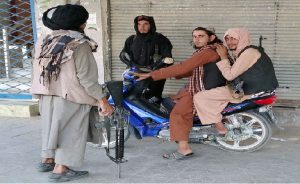 Reasons for the removal of the Afghan army chief were not disclosed. However, the development comes at a time when the Afghan security forces are busy fighting an intense war with Taliban fighters.
Reasons for the removal of the Afghan army chief were not disclosed. However, the development comes at a time when the Afghan security forces are busy fighting an intense war with Taliban fighters.
AFP adds: Two more cities–other than the six that were seized by the Taliban earlier within a couple of days–fell to the insurgents Tuesday, with one of them only 200kms away from Kabul.
The Taliban confirmed their seizure in separate tweets.
Six of the other provincial capitals to have fallen since Friday are in the country’s north, with the insurgents setting their sights on Mazar-i-Sharif, the region’s biggest city.
Its fall would signal the total collapse of government control in the traditionally anti-Taliban north.
Government forces are also battling the group in Kandahar and Helmand, the southern Pashto-speaking provinces from where the Taliban draw their strength.
Meanwhile, Washington’s special envoy Zalmay Khalilzad was in Qatar to try and convince the Taliban to accept a ceasefire.
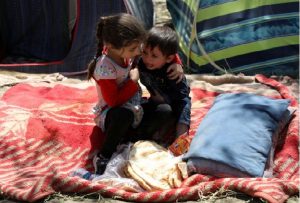 Envoys from hosts Qatar, Britain, China, Pakistan, Uzbekistan, the United Nations, and European Union were also due to discuss the situation in Afghanistan, a source told PMI.
Envoys from hosts Qatar, Britain, China, Pakistan, Uzbekistan, the United Nations, and European Union were also due to discuss the situation in Afghanistan, a source told PMI.
The United States has already all but left the battlefield.
Biden stressed that Washington would continue to support the Afghan security forces with air strikes, food, equipment and money for salaries.
“We trained and equipped with modern equipment over 300,000 Afghan forces” over two decades, he said.
“They have got to want to fight. They have outnumbered the Taliban.”
On the other hand the Taliban fighters we meet are stationed just 30 minutes from one of Afghanistan’s largest cities, Mazar-i-Sharif.
The “ghanimat” or spoils of war they’re showing off include a Humvee, two pick-up vans and a host of powerful machine guns. Ainuddin, a stony-faced former madrassa (religious school) student who’s now a local military commander, stands at the centre of a heavily-armed crowd.
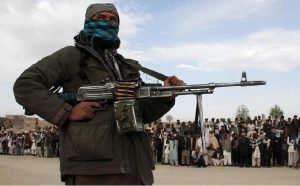 The insurgents have been capturing new territory on what seems like a daily basis as international troops have all but withdrawn. Caught in the middle is a terrified population.
The insurgents have been capturing new territory on what seems like a daily basis as international troops have all but withdrawn. Caught in the middle is a terrified population.
Tens of thousands of ordinary Afghans have had to flee their homes – hundreds have been killed or injured in recent weeks.
I ask Ainuddin how he can justify the violence, given the pain it’s inflicting on the people he claims to be fighting on behalf of?
“It’s fighting, so people are dying,” he replies coolly, adding that the group is trying its best “not to harm civilians”.
point out that the Taliban are the ones who have started the fighting.
“No,” he retorts. “We had a government and it was overthrown. They [the Americans] started the fighting.”
Ainuddin and the rest of the Taliban feel momentum is with them, and that they are on the cusp of returning to dominance after being toppled by the US-led invasion in 2001.
“They are not giving up Western culture… so we have to kill them,” he says of the “puppet government” in Kabul.
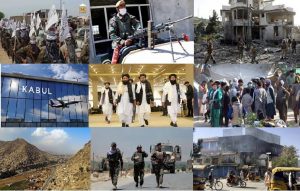 Shortly after we finish speaking we hear the sound of helicopters above us. The Humvee and the Taliban fighters quickly disperse. It’s a reminder of the continuing threat the Afghan air force poses to the insurgents, and that the battle is still far from over.
Shortly after we finish speaking we hear the sound of helicopters above us. The Humvee and the Taliban fighters quickly disperse. It’s a reminder of the continuing threat the Afghan air force poses to the insurgents, and that the battle is still far from over.
Afghanistan’s government is arming local groups as part of a three-phase plan to push back the Taliban offensive, the Afghan interior minister tells Al Jazeera in an exclusive interview.
Afghanistan Interior Minister General Abdul Sattar Mirzakwal said on Wednesday that Afghan forces are also focusing on trying to secure main highways, large cities and border crossings, after the Taliban seized nine provincial capitals in under a week.
Mirzakwal, who took charge of the country’s 130,000-strong police force five weeks ago, said the government was throwing support behind local volunteer militias known as “uprising movements”.
“We are working in three phases. The first is to stop the defeats [of the government forces], the second is to re-gather our forces to create security rings around the cities,” Mirzakwal told Al Jazeera’s Charlotte Bellis, who travelled with the minister to the Wardak province in central Afghanistan.
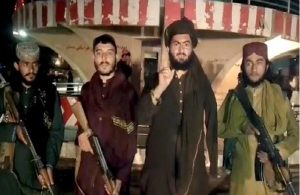 “All those soldiers that abandoned their posts, we’re bringing them back to their posts. The third is to begin offensive operations. At the moment, we’re moving into the second phase,” he added.
“All those soldiers that abandoned their posts, we’re bringing them back to their posts. The third is to begin offensive operations. At the moment, we’re moving into the second phase,” he added.
In the last three months, the Taliban have more than doubled their territory and in the last week, started to take provincial capitals, seizing nine by Wednesday.
Mirzakwal said a lot of the governments’ defeats were a result of them losing control of roads and highways.
Many areas must be resupplied by air and, after the United States began withdrawing its forces, the Afghan government lost a lot of that capability.
“Unfortunately, with their withdrawal, the fighting started in 400 areas of the country,” he said. “We have very limited air support; the helicopters have been busy with moving supplies and evacuating our dead and injured forces.”
Mirzakwal said the central government is delegating the power to local leaders to recruit and arm within their community to fight against the Taliban.
“These people have announced their full support to the president and government. They will fight the Taliban along with the government forces,” Mirzakwal said.
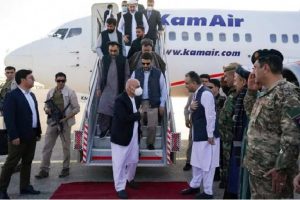 “There are concerns from the international community about these uprising forces at the moment but all their members will eventually merge into the Afghan national security forces.”
“There are concerns from the international community about these uprising forces at the moment but all their members will eventually merge into the Afghan national security forces.”
In Wardak, community leaders from across Afghanistan queued up to pledge their support or look for help.
Wardak’s governor Lawang Faizan said he already has 300 men fighting in one local uprising force, but he complained he could only provide weapons for two-thirds. He cannot provide the rest with with water, let alone money or arms, he said.
“For the last few months people are waiting for their weapons but unfortunately the promises I made to these people were not fulfilled, but there is no doubt in their loyalty and desire to help,” he said.
The government had reportedly launched an initiative in June that it called “National Mobilization”, arming local volunteer groups.
‘Leave killing’
 Thousands of police officers have also abandoned their posts in recent months, but the government said they are returning and will be retrained, then re-deployed to the field.
Thousands of police officers have also abandoned their posts in recent months, but the government said they are returning and will be retrained, then re-deployed to the field.
They also say 5,000 people have signed up for the police force in the last three weeks with another 2,000 graduating this weekend.
Fighting between Afghan forces and the Taliban has escalated dramatically since May, when the US-led military coalition began the final withdrawal of its forces – set to be completed by the end of August.
While the Taliban pledged not to attack foreign forces as they withdraw, it did not agree to a ceasefire with the Afghan government. Peace talks between the government and the Taliban in Doha have produced little results as the armed groups made rapid gains on the ground.
The government’s strategy to fight back is slowly becoming clearer, but its implementation is still fraught and the stakes have never been higher.
“I am asking the Taliban to stop their brutality. Leave killing. Sit down with love and we should find solutions,” Mirzakwal said.
“Let’s come and sit together and make a coalition government, one that would be acceptable to all sides. The sooner we do that, the better,” Mirzakwal said.
 Pressmediaofindia
Pressmediaofindia
